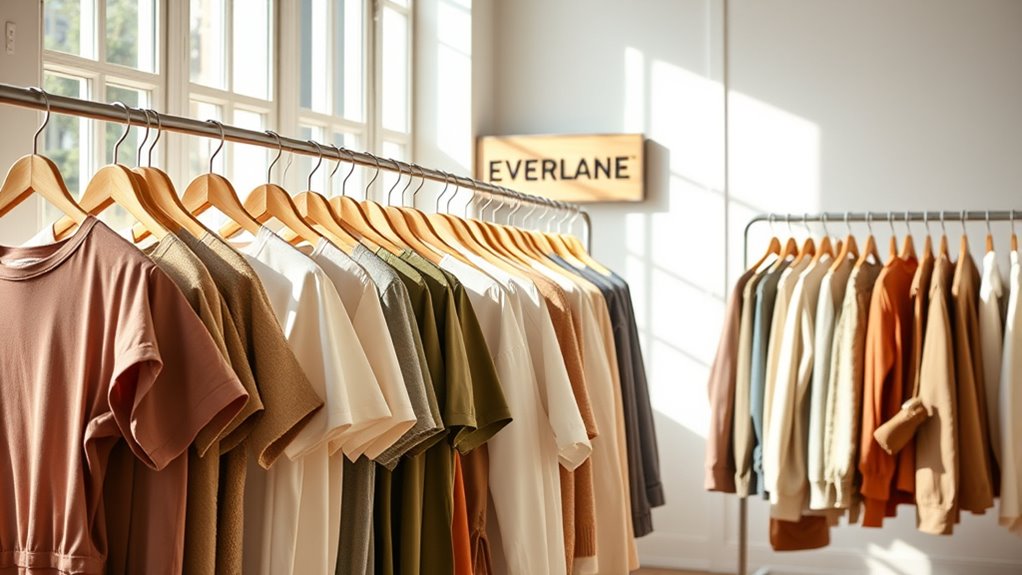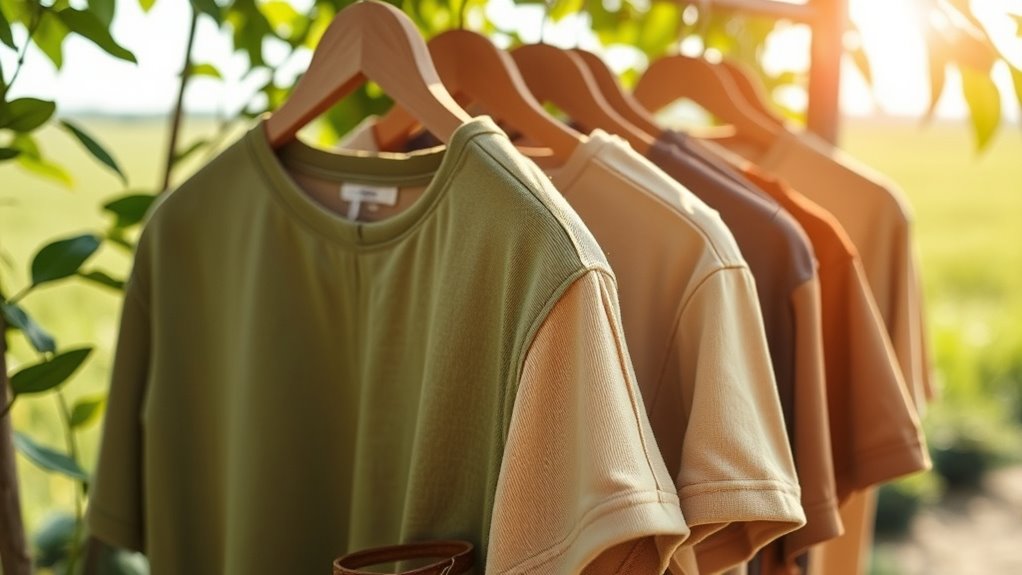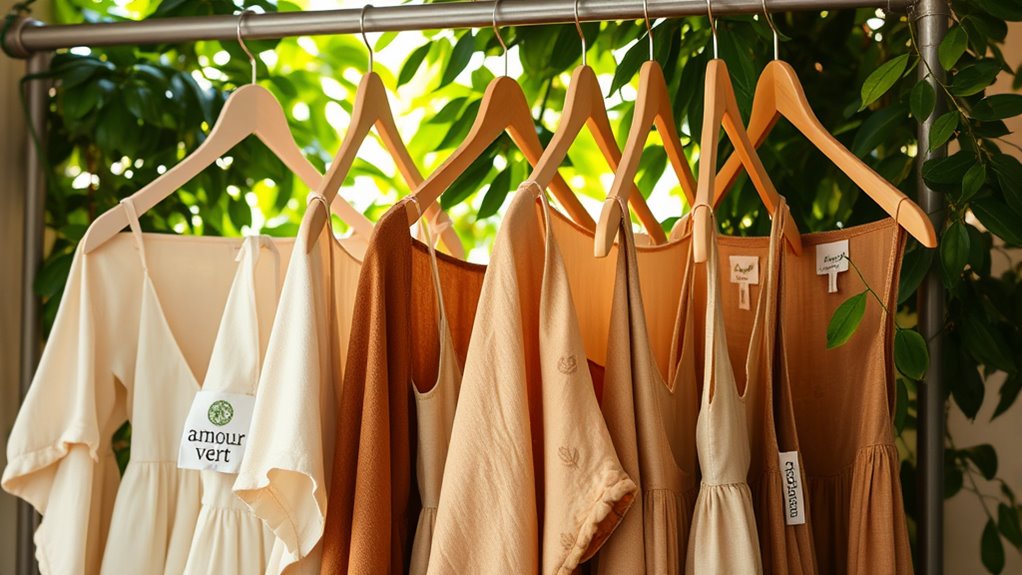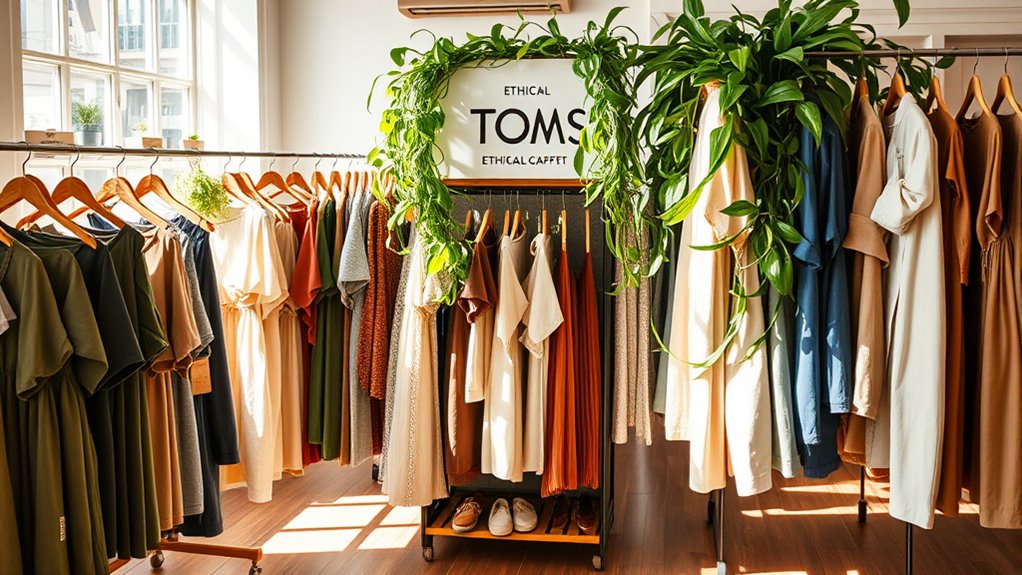If you’re looking to shop sustainably, brands like Patagonia, Everlane, Reformation, Stella McCartney, Amour Vert, Outerknown, Toms, and Tentree are great choices. They focus on eco-friendly materials, transparent supply chains, and ethical manufacturing practices to reduce environmental impact. These brands also support community initiatives and promote circular fashion. Choosing any of them helps you make a positive difference. Keep exploring to discover more about their unique efforts and how you can make smarter fashion choices.
Key Takeaways
- Leading brands like Patagonia, Everlane, and Stella McCartney prioritize eco-friendly materials, transparency, and ethical manufacturing practices.
- Many brands incorporate recycled fabrics, organic cotton, and sustainable sourcing to reduce environmental impact.
- Companies such as Amour Vert, Outerknown, and Tentree actively support reforestation, ocean conservation, and community initiatives.
- Durability and timeless design are emphasized to promote circularity and reduce fast fashion waste.
- These brands openly share their supply chain practices, environmental reports, and social responsibility efforts to foster consumer trust.
Patagonia

Patagonia is a leading name in sustainable clothing, known for its commitment to environmental responsibility. When you choose Patagonia, you’re supporting a brand that prioritizes eco-friendly materials like recycled polyester and organic cotton. They actively work to reduce their carbon footprint, using renewable energy in their manufacturing processes. Patagonia also encourages customers to repair and reuse their gear, promoting a circular approach to consumption. The company transparently shares its supply chain practices and environmental impact reports, so you’re informed about where your clothing comes from. Additionally, Patagonia donates a portion of its profits to environmental causes, aligning your purchase with broader conservation efforts. By choosing Patagonia, you’re making a statement that sustainability and quality can go hand in hand. Emphasizing sustainable sourcing ensures that every step of their production process minimizes environmental impact, reflecting a comprehensive commitment to environmental responsibility. Furthermore, Patagonia’s dedication to ethical manufacturing helps ensure fair labor practices across their supply chain. Incorporating air quality considerations into their production processes demonstrates their broader commitment to minimizing environmental impact.
Everlane

Everlane is a forward-thinking clothing brand committed to transparency and ethical manufacturing practices. When you shop with Everlane, you get clear insights into their supply chain, from factories to materials, ensuring no hidden secrets. They prioritize sustainability by choosing eco-friendly fabrics and reducing waste through innovative design. You’ll find timeless, versatile pieces that are built to last, encouraging a move away from fast fashion. Everlane also endeavors to keep prices fair, passing savings directly to you without sacrificing quality or ethics. Their commitment extends beyond products—they advocate for fair labor conditions and environmental responsibility. By choosing Everlane, you support a brand that values honesty, transparency, and sustainability, making it easier for you to make responsible fashion choices. Their approach aligns with sustainable fashion principles, emphasizing long-term environmental and social impact. Additionally, they focus on minimizing their carbon footprint by implementing sustainable practices throughout their supply chain. Incorporating regional resources and local expertise can also inspire innovative approaches to sustainable fashion and design. Embracing ethical manufacturing standards enables Everlane to maintain accountability and foster trust with consumers.
Reformation

Reformation stands out for using eco-friendly fabrics that reduce environmental impact. They maintain a transparent supply chain, so you know exactly where your clothes come from. This commitment helps you make more sustainable choices with confidence. Additionally, they promote ethical manufacturing practices that support fair labor conditions and recycled materials to minimize waste. Their dedication to sustainable sourcing ensures a positive environmental footprint throughout their production process. By implementing data-driven marketing strategies, Reformation effectively communicates their sustainability efforts to consumers, enhancing brand trust and loyalty.
Eco-Friendly Fabrics
Have you ever wondered how sustainable fabrics can transform your wardrobe? Eco-friendly fabrics like organic cotton, hemp, Tencel, and recycled materials reduce environmental impact without sacrificing style. These fabrics are produced with fewer chemicals, less water, and lower energy use, making your clothing more sustainable from start to finish. For example, Tencel is made from sustainably sourced eucalyptus trees and is biodegradable, while recycled polyester repurposes plastic bottles, cutting waste and conserving resources. Choosing garments made from eco-friendly fabrics not only minimizes your carbon footprint but also supports brands committed to ethical practices. Additionally, the color accuracy of fabrics can influence the overall appearance and longevity of clothing items. Incorporating sustainable manufacturing practices into the production process ensures that environmental benefits extend beyond just the fabric choice. Moreover, understanding the environmental benefits of these fabrics helps consumers make more informed decisions that support sustainability initiatives. Utilizing certifications and standards can further guarantee that your clothing aligns with true sustainable practices and ethical sourcing.
Transparent Supply Chain
Choosing eco-friendly fabrics is a great step toward sustainability, but knowing where your clothes come from is just as important. Reformation leads the way with its transparent supply chain, making it easy to see the journey of each piece. Here’s what they do:
- Share detailed info about fabric sourcing and production locations.
- Provide factory transparency, including working conditions.
- Disclose environmental impact data, like water and energy use.
- Regularly update their supply chain reports for accountability.
- Emphasize the importance of financial management in maintaining transparency and ensuring ethical practices.
Additionally, understanding current events related to ethical fashion helps consumers make more informed choices.
People Tree

Ever wondered how fashion can be both stylish and sustainable? People Tree makes that possible. As a pioneer in fair trade and eco-friendly fashion, they prioritize ethical practices from farm to closet. You’ll find beautiful, timeless designs crafted with organic cotton, Tencel, and other sustainable materials. Their commitment to fair wages and safe working conditions ensures your clothing supports positive change. Plus, their transparent supply chain means you can trust every piece is made responsibly. Whether you’re shopping for everyday wear or statement pieces, People Tree combines style with purpose. By choosing their garments, you actively participate in reducing environmental impact and promoting social justice. Incorporating sustainable materials like organic cotton and Tencel helps minimize ecological footprint, making your fashion choices even more impactful. Understanding clothing production processes can help you make more informed and ethical fashion choices. For example, learning about water usage in manufacturing can highlight the importance of choosing brands that prioritize water conservation. It’s fashion that looks good and feels even better to wear, knowing you’re making a difference. Additionally, being aware of ear wax odor can remind us of how natural materials and hygiene influence our daily lives and product choices. Recognizing sustainable manufacturing techniques can further guide you toward brands committed to reducing their ecological footprint.
Stella McCartney

Stella McCartney stands out in the fashion world for her unwavering commitment to sustainability and ethical design. As a consumer, you’ll appreciate her innovative approach, which includes: 1. Using eco-friendly materials like organic cotton and recycled fabrics. 2. Avoiding animal-derived products, ensuring cruelty-free collections. 3. Implementing innovative manufacturing techniques to reduce waste. 4. Partnering with suppliers committed to environmental and social responsibility. Additionally, her focus on sustainable textiles ensures her collections prioritize both style and environmental impact. Her dedication to ethical production practices further emphasizes her leadership in sustainable fashion, inspiring others to adopt eco-conscious methods. Incorporating layered textures and colors into her designs demonstrates her commitment to fostering positive change within the industry.
Veja

Veja has gained recognition for redefining sustainable footwear with a focus on transparency and ethical production. You’ll appreciate how they prioritize fair trade practices and eco-friendly materials, like organic cotton, wild rubber, and recycled plastics. Their transparent supply chain lets you see exactly where each component comes from, ensuring no shortcuts or unethical labor. Veja’s commitment extends beyond materials; they work closely with local communities to promote fair wages and working conditions. Their designs combine simplicity with durability, making them both stylish and long-lasting. By choosing Veja, you support a brand that actively reduces environmental impact while fostering social responsibility. If you want footwear that aligns with your values, Veja stands out as a pioneering leader in sustainable fashion.
Amour Vert

Amour Vert stands out as a sustainable clothing brand committed to environmentally conscious fashion. You’ll love their focus on eco-friendly fabrics and ethical production. Here are four reasons to contemplate this brand:
Amour Vert offers stylish, eco-friendly fashion with ethical practices and sustainable materials.
- They plant a tree for every item sold, helping offset carbon footprints.
- Their fabrics include Tencel, organic cotton, and recycled materials.
- They prioritize local manufacturing to reduce transportation emissions.
- Their designs are versatile, timeless, and made to last.
Outerknown

Outerknown is a standout in the sustainable fashion world, combining stylish design with a strong commitment to environmental responsibility. You’ll find apparel made from eco-friendly materials like organic cotton, recycled fabrics, and hemp, all crafted with transparency and fair labor practices in mind. The brand’s focus on durability means your pieces are built to last, reducing waste and encouraging mindful consumption. Outerknown also partners with initiatives that support ocean conservation and sustainable farming, aligning their mission with broader environmental goals. By choosing Outerknown, you’re not only elevating your wardrobe with modern, versatile styles but also actively supporting a more sustainable fashion industry. It’s a brand that proves fashion and sustainability can go hand in hand seamlessly.
Toms

Toms has built a reputation as a leader in sustainable footwear by integrating social impact into its core business model. When you choose Toms, you’re supporting more than just stylish shoes. Here are four reasons why Toms stands out:
- One-for-One Giving Model: For every pair sold, Toms donates a pair to someone in need.
- Sustainable Materials: They use eco-friendly materials like recycled polyester and organic cotton.
- Fair Labor Practices: Toms ensures fair wages and safe working conditions across their supply chain.
- Environmental Initiatives: They aim to reduce their carbon footprint through sustainable packaging and production methods.
Tentree

Have you ever wondered how a clothing brand can grow while actively helping the planet? Tentree makes it possible by planting ten trees for every purchase you make. Their commitment to sustainability goes beyond planting trees — they use eco-friendly materials like organic cotton and recycled polyester. As you shop, you’re directly contributing to reforestation projects and supporting communities worldwide. Tentree’s transparent approach lets you see exactly where your impact is going, making your choices meaningful. Their stylish, comfortable apparel proves that sustainable fashion can be both functional and trendy. By choosing Tentree, you become part of a movement that prioritizes the planet’s health while offering you high-quality clothing. It’s a simple way to make a positive difference every time you shop.
Frequently Asked Questions
How Do These Brands Ensure Fair Labor Practices?
You want to know how brands ensure fair labor practices. They often do this by sourcing materials from suppliers with strict ethical standards, conducting regular audits, and partnering with organizations that promote workers’ rights. Many brands also publish transparency reports and obtain certifications like Fair Trade or B Corp. By actively monitoring their supply chains and advocating for fair wages, they make certain workers are treated ethically and work in safe conditions.
What Materials Do They Prioritize for Sustainability?
When choosing sustainable clothing, you should look for brands that prioritize eco-friendly materials. They often use organic cotton, hemp, Tencel, or recycled fabrics because these reduce environmental impact. These brands avoid synthetic fibers like polyester, which can harm ecosystems. By focusing on natural, renewable, and recycled materials, you support a more sustainable fashion industry and help lower pollution and resource depletion.
Are Their Products Truly Biodegradable or Recyclable?
Think of their products as seeds planted for the future. Many brands claim their items are biodegradable or recyclable, but it’s vital to check if these claims are backed by certifications. Some materials break down naturally, while others can be recycled multiple times without losing quality. You should look for clear labels and proof of eco-friendly processes, ensuring your choices truly support sustainability and aren’t just greenwashed.
How Do They Reduce Water and Energy Consumption?
You can reduce water and energy consumption by choosing brands that use eco-friendly processes. They often utilize techniques like water-efficient dyeing, recycled materials, and renewable energy sources in manufacturing. Some brands also implement innovative methods like zero-waste production and digital printing, which cut down on resource use. By supporting these practices, you help lower environmental impact and promote sustainable fashion choices that conserve essential resources.
What Certifications Verify Their Environmental Claims?
Ever wondered how you can trust a brand’s eco-claims? Certifications like GOTS, Fair Trade, and Bluesign act as badges of authenticity, verifying that brands meet strict environmental standards. By choosing products with these seals, you’re supporting companies committed to transparency and sustainability. These certifications guarantee your clothing is made responsibly, reducing environmental harm and promoting ethical practices—making your eco-conscious choices more trustworthy and impactful.
Conclusion
By choosing these brands, you’re planting seeds of change in the fashion world. Each piece you wear becomes a ripple in a pond, spreading sustainability and style alike. Your wardrobe can be a garden of eco-friendly growth, flourishing with purpose and conscience. So, embrace these brands like trusted allies on your journey—together, you can weave a future where fashion blooms with responsibility and beauty. Your choices today shape a greener, brighter tomorrow.










